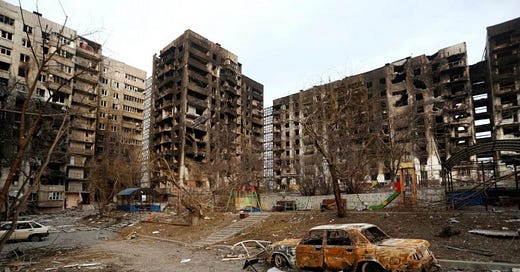Establishing an International Tribunal for Ukraine Aggression Before It Is Too Late
sourced mainly from Politico
With a potentially bad peace deal for Ukraine, holding Russia accountable for war crimes seems more remote than at any time since its full-scale invasion of Ukraine.
In its quest to normalize relations with Moscow, the Trump administration has shown itself willing to negotiate a peace deal that is fundamentally favourable to Russia’s terms.
The current U.S. administration is hostile to international justice and acts accordingly. For example, it has imposed severe sanctions on the International Criminal Court for its investigations of Israeli officials. And those sanctions also make it harder for the court to investigate war crimes in Ukraine and elsewhere, Politico reports.
So in negotiating a peace deal for Ukraine, we can’t rule out the possibility that Trump could go even further and grant amnesty to Russian President Vladimir Putin and other senior Kremlin and military officials involved in waging the war. Such a move would be in line with the American leader’s view that might make it right and his admiration for Putin.
Make no mistake, an amnesty for serious international crimes would violate international law. But by pressuring Ukraine and Europe to accept a deal, Trump could demand that they drop their cases against alleged Russian war crimes and halt other accountability efforts.
Such a retreat would make a mockery of international law. It would also support the view that great powers can act with impunity against their neighbours, opening the door for other autocrats to seize territory from others without consequences.
All of this would run counter to the EU’s strong interest in an international order based on norms and rules.
What can the EU do?
First, the bloc must act now, before a peace deal is negotiated, to protect accountability efforts in Ukraine. This should include swiftly establishing the proposed Special International Court for the Crime of Aggression.
Russia’s aggression against Ukraine is the original crime that paved the way for all other international crimes committed in Ukraine. And unlike war crimes, crimes against humanity, there is no international tribunal that can try the crime of aggression — meaning that an ad hoc tribunal must be established.
Since 2023, a group of almost 40 countries — mainly from Europe, but also from Asia, Oceania, and North and Central America — have been working with Ukraine to establish this tribunal, and they are close to reaching an agreement on how it will operate.
In short, the tribunal would be tasked with investigating top Russian leaders for their role in preparing for and launching the war in Ukraine. It would be established by the Council of Europe and based on a treaty between Ukraine and the Council of Europe, benefiting from a combination of territorial jurisdiction stemming from Ukraine and international law.
Such a tribunal would be valuable not only for its indictments but also because its actions would establish the historical truth about how the war began and who was behind it, as the Nuremberg trials did after World War II.
As for the timing, setting up the tribunal now, before serious peace negotiations begin, would help to protect against any attempt to overturn the demand for accountability. And once the tribunal is set up, it would operate autonomously, operating largely outside of political deals, making it virtually impossible to shut it down.
In these circumstances, an amnesty for Russian leaders in a peace agreement would be irrelevant, as the tribunal would still have jurisdiction to act.
If Europe waits until peace talks begin, however, there is a risk that the tribunal will be sacrificed as part of the negotiations. And it would be much more politically difficult to set up after a peace agreement—especially if it included an amnesty.
Meanwhile, with Trump back in the White House, the creation of the special tribunal takes on even greater significance. His statements that the US will get Greenland “one way or another” or make Canada the 51st state should be taken seriously.
So, the creation of the special tribunal now would be a powerful signal to all dictators around the world, showing that countries will not accept invasions and annexations and that international justice can find ways to hold leaders accountable for crimes of aggression—no matter who they are.
This tribunal should consider in parallel with the crimes the question about the immobilised Russian Central Bank assets confiscation. They could be seized on the basis of its decision and used to meet the rearmament needs of Eastern Europe, but they were focused mainly while the war was running on the deliveries to the Ukrainian army. Their size covers about one-third of the estimated rearmament needs of the EU. As well as zero of its short-sightedness and elites’ greed.





